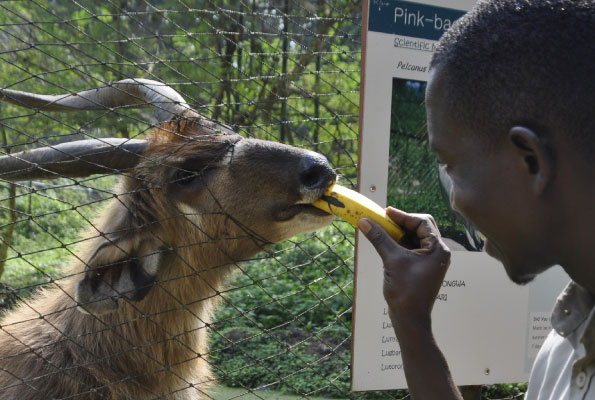Activists concerned as 5.5b wild animals kept captive

A male sitatunga being fed by Uganda Wildlife Education Centre guide and animal care-taker, Nicholas Muhindo in 2016. PHOTO/FILE
What you need to know:
- Animal activists say keeping animals captive risks explosion of zoonotic diseases, potentially to pandemic proportions.
Animal activists have called upon global governments to desist breeding a whopping 5.5 billion wild animals in captivity.
Animal activists say governments should consider alternative forms of wildlife repopulation and take immediate action by implementing a comprehensive and timely phase-out of any commercial wildlife breeding and associated trade.
“Whether for wildlife repopulation, pet industry, trophy hunting, entertainment, traditional medicine, decoration, or fashion– cruel wildlife farming must end now. Wild animals have the wildlife right,” report findings released March 5 in Kampala suggest.
The activists titled their findings “Exposed: The dark reality of profit-driven captive wildlife farming.”
“Members of the public are encouraged to support the wildlife not for profit campaign by supporting the demand to end wildlife farming,” they remarked.
Speaking at the report launch, international animal welfare organization World Animal Protection (WAP) wildlife campaign manager Edith Kabesiime said: “Our report that forms the base for this campaign has some shocking revelations on the cruelty wild animals go through in captive farms. Recently, Uganda wanted to go the same route, but we highly discourage it.”
She added: “It will create more problems than what it is trying to solve in the name of repopulations. The report captures that in some countries where this is being practiced, there are more wild animals in captive farms than in the wild and the problems this has brought are enormous.”
Animal activists say high numbers of animals living in cramped and unhygienic conditions puts caretakers and the public at risk of zoonotic diseases, potentially to pandemic proportions like Covid-19 and Ebola among others.
Further in the report, animal activists found “an astonishing lack of transparency and inadequate monitoring across the global multi-billion-dollar industry, where sentient animals are treated as mere components in a cruel production line.”
Shockingly also in the findings, the animal activists found that some captive wildlife populations are now larger than those living free.




